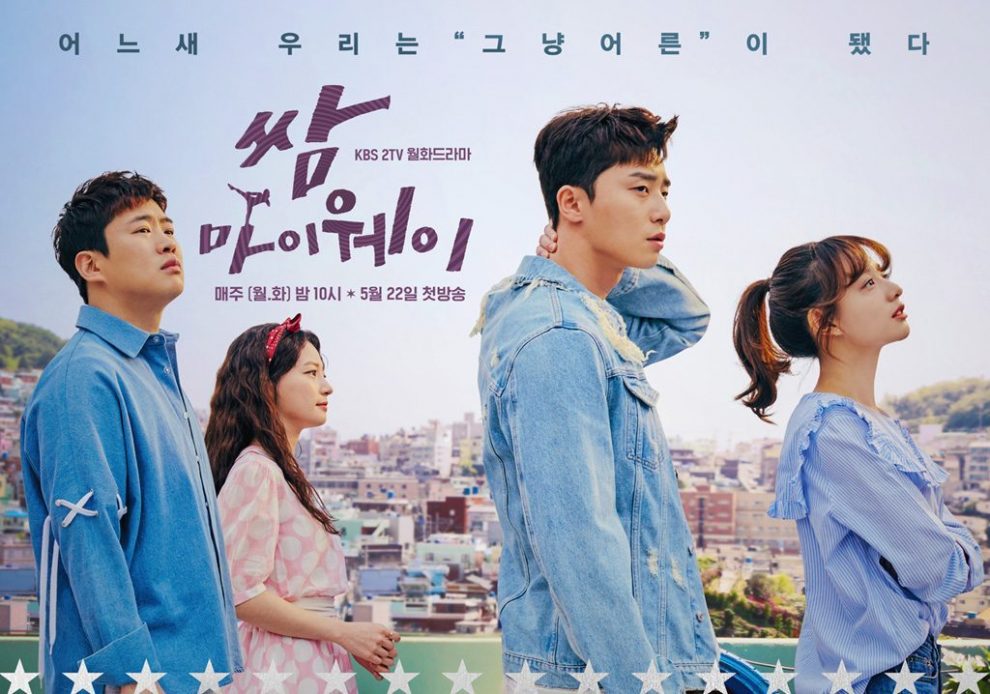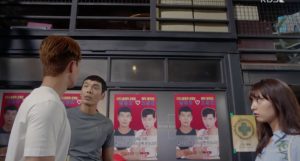Introduction
This paper explains the Confucian value of hierarchy in Korean society. The philosophy idea of Confucianism [1]came to Korea in the fifteenth century. It shaped Korean society for hundreds of years in both political action and social interaction. Confucianism is a major factor in creating the collectivist mindset throughout East Asia, especially in Korea, all social interaction is dictated by the Confucian value of hierarchy.[2] The unequal environments of economic inequality likely have important consequences for relationships of the people at the top and bottom of the class hierarchy (Cote 2017: 269). Social class has then become the main reason to influence the daily life of South Korean people. After the final crisis in 1997, the society appears many problems regarding “cross-class” social contacts. In this paper, I will use the example of Fight for My Way (2017) to explore how the hierarchical society in South Korea operates in real life, and to argue the real-life young people in South Korea who is unlike the neoliberal [3]fantasy of a rich boy and a poor girl shown in K-drama. Rather, people stays in low social class suffers torturously by the hierarchical institution, facing various problems including job discrimination, workplace bullying, gender stereotype and class discrimination regarding marriage and relationship.
About the Drama
The drama Fight for May Way is a South Korean television series about four individuals Ko Dong-man, Choi Ae-ra, Kim Joo-man and Baek Seol- hee who are considered to be “third-rate [4]lives”. They lack experience and highly educated background but eventually finds passion to pursue the goals they once gave up. It is an inspirational dramatic story about how young people struggling in their mundane lives can finally find their own way to live a happy life.
Ko Dong-man, a former taekwondo player who used to be famous but had to stop because of a painful past is now a nameless mixed martial arts fighter. Choi Ae-ra is a strong and sassy girl who works as a department store employee at the information desk but dreams of becoming an announcer. Kim Joo-man landed a permanent position at a home shopping network, and Baek Seol-hee is a girl who is works in customer service at the home shopping network. All of the four main characters represent the most ordinary people in Korean society. The drama describes an inspirational story that is different from other Korean dramas that usually tells a story of a rich boy and a poor girl, it tells about what regular people do and feel in their mundane living. The drama Fight for My Way is a statement that South Korean society is starkly hierarchical. The people of lower social standing suffer great job insecurity, experience gender inequality, and generally struggle against class discrimination.
Job Discrimination
Since the end of the Korean War, the Korean economy has experienced remarkable transformation. The Korean’s per capita income jumped from under US$100 to over US$10,000 in the last fifty years (Park and Mah 2011: 262). However, the economic crisis in 1997-1998 caused an abrupt decline in the real GDP growth rate, resulting the Korean labor market fell into an unprecedented turmoil. Hundreds of firms went bankrupt from day to day and unemployment soared up dramatically (Hur 2001: 4). As the number of the job demand increases, workplace discrimination and its relationships to changes in employment status among low-educated and non-regular workers is becoming an increasingly important social concern. These two groups of people, non-regular workers and low-educated workers, suffered most seriously of being discriminated in the labour market in Korean society.
In Fight for My Way, the difficulty for a low-educated and low social status youth to land a job is revealed in the drama. Students like Ae-ra, who comes from low-income families are forced into local or cheaper universities to reduce daily expense. Most of them do not have enough time for higher education. Students from these situations usually finish earlier from universities and graduate without advanced degrees or extra certificate. This allows them to be easily weeded out from the competitive job market. There is a dialogue that shows how hard to compete for a job in Korea if you do not have a shiny diploma:
(during the interview)
Ae-ra: Excuse me, you haven’t asked me anything yet.
Interviewer: Do you have any talent?
Ae-ra: talent?
Interviewer: for example, something you can do on varity shows.
Ae-ra: Variety shows? How about a song? Should I sing?
Interviewer: that would take too long. We’ll just consider we listened to it. Good job everyone.
Ar-ra: Then…How about a dance? I can do a cover dance of AOA.
Interviewer: I understand you’re passionate, but if you dance right now, it will make everyone feel awkward.
Ae-ra: I prepared an introductory opening.
Interviewer: Number 25. I don’t know how it’s like to you, but time is gold to us. If you want to steal our time, you should have filled up your time first. Other interviewees went abroad to study, went to graduate school, and volunteered. What were you doing during that time? Passion should be proven through your experiences.
Ae-ra: I…earned money.
Interviewer: pardon?
Ae-ra: while they went abroad to study and volunteer, I…was earning money. (Fight for My Way 2017)
In episode 8, Ae-ra feels embarrassed during the interview because she is the only one who is not considered by the interviewer. Instead of pursuing a better diploma or perfecting her working experience, she spent her university life seeking alimony of living instead of pursuing a better diploma or perfecting her working experience. Under the pressure of her embarrassing family dilemma, she has to conquer the existing gap between her and her competitors. She tries to use her passion to persuade the interviewer that she can undertake the job well, but low education and monotonous personal information destined her elimination for the job. During the interview, all the other competitors has resumes which includes overseas experience and outstanding educational background, while Ae-ra only had a brief self-introduction on the paper. Undoubtedly, she was easily weeded out from the interview.
In fact, Ae-ra represents the many young South Korean’s feelings of difficulty when it comes to job hunting, if they don’t have a shiny diploma or extensive working experience. Due to the financial crisis in 1997, the unemployment rate soared up from day to day (Hur 2001: 4). The high unemployment due to deterioration of business or no more work results an increase in competition in labour market, which has made low-educated workers or low-skilled Korean workers more realistic to change their perception of work regarding working conditions or potential future (Kim and Park 2005: 37). Students like Ae-ra, who came from a small town in rural area, cannot land a decent job, even though she has a gifted eloquence. During the time in university, she was well-known by her friends for her eloquence. As a dream job, she was expected to be a famous anchor. However, after graduating, she works in a department store as a store employee who greets customers at the information desk. Her low social status and lack of education background cause her being discriminated in the labour market.
On the other hand, there exists inequality in the available job opportunities for low-educated workers or low social class workers. Better jobs are often saved for those who have a higher social background. In Fight for My Way, there is a scene where Choi Ae-ra competes for the job of announcer with a girl whose brother-in-law was the owner of the department store. The retirement of the former announcer of the department store gave Ae-ra an opportunity to prove her ability in the broadcasting industry. However, the family connection on the other candidate and the industry manager left her no choice but to give up her dream of becoming an announcer. As Cho et. al states in their article, social class is negatively correlated with job insecurity and job strain, which means people in low social class suffered from higher insecure employment and job strain (Cho 2008: 62). The class difference resulted them receive unfair treatments during job hunting with other competitors. Ae-ra not being a part of the higher social class limits her job opportunities in the first place. The unfair treatment among the working-class people can be reflected in South Korea working places, which then influence the career development of working-class people. However, not only does job discrimination play a big role, workplace bullying has been an issue in Korean society as well.
Workplace bullying
It is common to see young, working-class people being bullied through both verbal abuse and physical abuse from the manager during work. This makes it difficult for them to gain a foothold in job market. The authoritarian roots and the centralist structure of South Korean society are two main origins for the causing of job insecurity among lower class youth, and upper-class people always hold the authority to control their subordinates. Those employed workers have no choice but to follow orders from the boss because the boss could decide whether to fire the worker or not in a short span of time. The principle that everyone in a society is equally important, no matter how much money they have or what social class they come from has now become a frequent theme in K-drama. In Fight for My Way, both Ko Dong-man and Choi Ae-ra are now facing the pressure of job violence from people of higher hierarchy, and it is not hard to see such violence in the reality. Dong-man’s manager who blames the faulty machine on Dong-man and forces him do double his initial workload and Ae-ra’s humiliation from kneeling in front of the thief who made her apologize even though she did nothing wrong, emplicitly the problem of abusive treatment between worker and customer or worker and manager is still serious in South Korea.
Gender Role Stereotypes of Female Characters
Gender role stereotype [5]shapes what women or men ought to do through cultural sanctioning and rewarding in a certain society (Johnston and Swanston 2006: 3). In a traditional Confucian family system[6], the position of women is represented in virtue of obedience to father, husband and son (Leung 2014: 1). Although contemporary Korean women enjoy nearly equal legal status with men, the Confucian value of gender role is till deeply rooted in South Korea’s society. In a traditional cognition of patriarchy society, women stay in a lower status then men; to be a good woman, they are not encouraged to be highly educated and are expected to stay at home and take care of husband and children. Fight for My Way is an example showing the “traditional Confucian family system”, a system which the male holds superiority within the patrilineal family. In Fight for My Way, the character Baek Seol-hee is typical girl who fully follows the conventional notions of femininity. She is characterized as an ideal woman who dreams to be a mother and a wife. She follows the traditional notions of the appropriate female behaviors through the actions of “cooking dinner” and “washing dishes”. She is weak and obedient who sees her boyfriend Joo-man as the world. Joo-man, on the other hand, act dominantly such as forcing Soel-hee to do what he wanted her to do and stays in a leading position in their romantic relationship.
In addition, the value system influences deeply in their behaviour pattern, which limits female’s opportunities and specific experiences in labour market. It is extremely normal that women are often discriminated against in job market. The inequality of opportunities in looking for work between the different genders have always been a big barrier for women. With the study of Jung et. al, women generally fare poorly in the multidimensional approach (mainly income, education, health, employment, social capital, leisure, work-family reconciliation, housing, and social security) than men in South Korea (Jung 2010: 3). With a closer look at the shifting gender composition of union membership, unions overwhelmingly represent male workers, which leaves female workers vulnerable to unfavourable wage bargains and insecure employment. Male-dominated trade unions also neglect to address the disproportionate expansion of women in irregular employment. The unfair treatment between genders is sometimes based on cultural stereotypes that cast women primarily as a role of wives and mothers (Patterson and Walcutt 2013: 85). As also has been witnessed in Korean society, the work-family relation for female participation in the labour force is not isolated from socially assigned gender roles that include the definition of motherhood and gender division of family responsibility (Won 2015, 1). The increase in maternal employment has been a big challenge for Korean society as a whole.
Class Discrimination Regarding Marriage and Relationship
The high level of economic inequality has the most important impact on relationships between people of the same and different social class backgrounds (Cote 2017: 269). As wealth gap rises, social and economic institution, individual material resources, education and neighbourhoods create barriers that separate those from higher and lower-class backgrounds (Ridgeway 2014: 1). Social class represents a distinct social group category in society which is associated with unique stereotypes (Cote 2017: 270). For instance, rich people are normally judged as competent but cold, whereas the poor are judge as low in both warmth and competence (Fiske et al. 2002: 1). The phenomenon of the distinction between poor and rich people are shown in Fight for My Way, where Soel-hee represents a lower-class country girl who is discriminated by the man side of the family. In episode 6, Soel-hee brings her mother’s food to Joo-man’s relative’s party and got the cold shoulder. Kim Joo-man’s family looks down at Baek Soel-hee and treats her very disrespectfully because Soel-hee’s family background was not accepted by them. They expected their sister in law to be a more highly educated woman, instead a woman whose parents come from a country side and sell jokbal. The difference in life experience and developmental trajectories between two families creates big gaps between Soel-hee and Joo-man. When Soel-hee went to the Joo-man’s family party, the issues between different social classes in Korea has been shown. Consider their attitudes and humiliation toward Soel-hee: it is more likely that they were judging Soel-hee because of her family background. This includes discrimination from Seoul toward other regions, in addition to discrimination from the wealthy to the poor. According to marriage, Korean has their own traditions that a well-matched marriage is based on equal educational, family and regional background as well as the personal economic strength, meaning that a marriage relationship with a powerful family was of primary consideration (Lee 2008: 5). This formula of marriage system lasts until recent Korean society. Considered by these conditions, Soel-hee is not the best choice for Joo-man as a fiancée. Moreover, the contemporary Korean society still exists the issue of regional discrimination. Countryside is discriminated against in the urban and suburban area. Different lifestyles and leisure activities create a barrier to including higher status people in their network. They are treated differently with people of different social and money classes.
In addition to Seol-hee, class difference also creates troubles in Ae-ra’s relationship with Moo-bin. Ae-ra broke up her dating relationship with Moo-bin because he already engaged with a Japanese woman whose father is the chief director of the hospital. Moo-bin admitted his relationship with chief director’s daughter and his intention of courting her. He also confessed that he is truly in love with Ae-ra and promised to treat her like a princess. In fact, Moo-bin’s engagement is closely related to the perfect match of the same class. He knows that Ae-ra’s social status cannot exchange benefits for the future planning of his career development, and his desire on the future job standing is so ambitious that the simple romance given by Ae-ra could not be fulfilled. Thus, he chooses to lie on Ae-ra and to use a utilized marriage to help him reach a higher position of job. The relationship between these two couples fully explains the class influence on the Korean marriage market.
Conclusion
The working class Korean people’s lives are represented through the discussion of the characters in the drama Fight for My Way (2017). Class issue has been the major problem raised in Korean society. Despite the increasing of Westernization and the wide-spread popularity of Christianity continually effecting Korean society, the traditional philosophy’s influence of Confucianism is still apparent today. The historic levels of economic inequality alter the life experiences and developmental trajectories of the people among different class hierarchy (Kohn & Schooler 1969: 3). This hierarchical structure raised by the inequality of economy contributes to several social problems faced in Korea. Due to the devastating economic crisis, declining macroeconomic conditions brought about major labour market disruptions in 1998. The result of increased unemployment, increased job insecurity and rising poverty and inequality brought by the declining macroeconomic conditions was not only economic misery but also social pain: increased homelessness, rising crime, heightened school dropouts, an accelerating divorce rate, and overwhelming sense of social malaise (Hur 2001: 4). The intensity of social stress brought by the unstable economic crisis consequences the lower-class people being discriminated in the society. Those young people who come from low-income families face various troubles relating to career, marriage and social relationships that threaten them get into the society. The examples of Ae-ra and Seol-hee’s issues demonstrate the general recent social problems arise from class difference in Korean society. Even though the increase in public demand encourages the latest K-drama to develop a kind of utopia society, the social atmosphere within South Korea is still depressing in recent years, and the problems among work-class people of class difference and discrimination are still waiting to be solved.
References
Abelmann, Nancy, Park So Jin and Ki Hyunhee. “College Rank and Neo-Liberal Subjectivity in South Korea: The Burden of Self-Development.” Inter-Asia Cultural Studies, 10, no. 2 (2009): 229-247.
Chan, Brenda, and Wang Xueli. “Of Prince Charming and Male Chauvinist Pigs: Singaporean Female Viewers and the Dream-world of Korean Television Dramas.” International Journal of Cultural Studies, 14, no. 3 (2011): 291-305.
Chi, Eunju, Rhee Yangho, and Kwon, Hyeok Yong. “Inequality and Political Trust in Korea.” Korea Observer, 44, no. 2 (2013): 199-222.
Cho, Sung-II et. al. “Social Class, Job Security, and Job Strain in Korea.” Scandinavian Journal of Work, Environment & Health. 43, no.2 (2008): 60-65.
Joanna, Elfving-Hwang. “Cosmetic Surgery and Embodying the Moral Self in South Korean Popular Make-over Culture.” The Asia-Pacific Journal, 13, no. 2 (2013): 1-16.
Jung, Hae-Sik, Kim Soo-Wan and Ahn, Sang-Hoon. “Multidimensional Inequality in South Korea: An Empirical Analysis.” Asian Social Work and Policy Review, 10, no. 8 (2014):170-191.
Koh, Eunkang. “Gender Issues and Confucian Scriptures: Is Confucianism Incompatible with Gender Equality in South Korea?” Bulletin of the School of Oriental and African Studies, 71, no.2 (2008): 345-362.
Koo, Hagen, and Hong Doo-Seung. “Class and Income Inequality in Korea.” American Sociological Review, 45, no. 4 (1980): 610-626.
Lee, Park Hyunjoon. “Marriage, Social Status, and Family Succession in Medieval Korea.” Journal of Family History, 43, no. 4(2008): 1-16.
Song, Jae Jung. “For Whom the Bell Tolls: Globalization, Social Class, and South Korea’s International Schools.” Globalization, Societies and Education, 10, No. 2 (2013): 136-59.
Sone Jee-eun Regina. “The Soy Bean Paste Girl: The Cultural and Gender Politics of Coffee Consumption in Contemporary South Korea.” Journal of Korean Studies, 43, No. 2 (2014): 429-448.
[1] Also known as Ruism, is described as tradition, a philosophy, a religion, a humanistic or rationalistic religion, a way of governing, or simply a way of life.
[2] https://berkleycenter.georgetown.edu/posts/confucian-hierarchy-in-modern-day-korea
[3] Refers primarily to the 20th-century resurgence of 19th-century ideas associated with laissez-faire economic liberalism.
[4] Extremely low in quality or value: worse than second-rate
[5] Refer to common and culture-wide beliefs of gender attributes, role behaviour and occupations.
[6] With its “natural” hierarchy of ruler and subject, mirrored the home, with its “natural” hierarchy of husband and wife, and older and younger children










